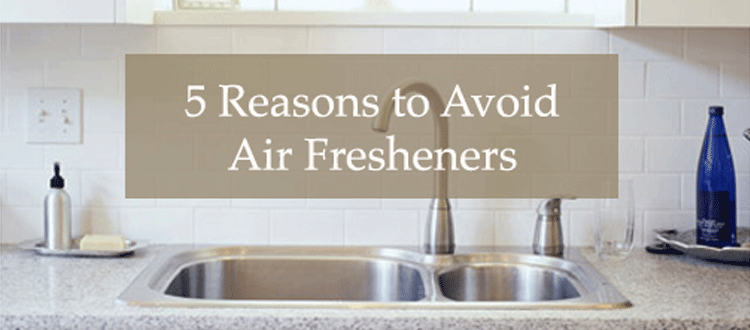5 Reasons to Ditch Air Fresheners
 |
|
Cassidy Randall Director of Outreach |
This blog originally appeared on Huffington Post.
Have you ever wondered what’s in those myriad air fresheners that make your home smell like a tropical vacation or a woodsy cabin surrounded by wildflowers? It’s certainly not roses… Here are five reasons we think you should avoid air fresheners altogether.
1. Secret Ingredients
Don’t pick up your favorite air freshener and try to check the label for the ingredients. You won’t find any.
That’s because most companies keep fragrance ingredients a secret, dubbing them “confidential business information.” This scent secrecy is practiced across industries–cleaning products, personal care products, cosmetics, to name a few–but this problem becomes even more egregious when it comes to air fresheners, in which fragrance can make up 70 to 80 percent of the overall composition of the product. That means we have no information on the vast majority of chemicals we’re spraying in our homes.
I bet you’re thinking, Wait, seriously? Isn’t there some law that requires companies to tell us what’s in their products? The answer is no. In addition to the fragrance secrecy that’s practiced across industries, there’s no law that requires cleaning product companies (which make air fresheners) to list any of the ingredients in their products–which means that companies can legally keep toxic chemicals a secret from you. We know, we think it’s ridiculous too–and we’re working on fixing that!
2. Toxic Chemicals in Fragrance
In 2010, for the first time, the International Fragrance Association released a master list of more than 3,100 chemicals that are used by most manufacturers. Chemicals on that list include carcinogens like p-dichlorobenzene and styrene oxide; endocrine disruptors like galaxolide and tonalide; reproductive toxicants like phthalates; problematic disinfectants like triclosan and ammonium quaternary compounds; and numerous allergens.
A fragrance can be made up of more than 100 chemicals–and could include any of those harmful chemicals.
At Women’s Voices for the Earth (WVE), we were curious which of these chemicals might be hiding out in some brand-name air fresheners. So, in 2011, we independently tested some Glade products. Test results revealed synthetic musks and allergens. Test results also revealed the presence of phthalates, which the company had committed to phase out two years before. SC Johnson, the makers of Glade, claimed this was a contamination issue, but we have no confirmation that this issue has been resolved. We also tested Febreze and AirWick, which both came back positive for high levels of allergens.
Here’s the thing: The lab was only specifically testing for musks, phthalates, and allergens because we asked them to. Unfortunately, we don’t have the money to walk into a lab and say, “Tell us everything that’s in this fragrance.” (Sure, companies deconstruct other companies’ scents all the time, but we don’t have that kind of budget.) In essence, that means that any of the thousands of ingredients we know are commonly used in fragrance could also make up a Febreze, AirWick, or Glade scent.
3. Impact to Women’s & Children’s Health
Studies are increasingly showing that chemicals in fragrance are harming our health, particularly the health of women and children.
- One study of pregnant women showed a link between the use of air fresheners and aerosol sprays and an increase in headaches and depression in the mothers, as well as ear infections and diarrhea in their babies.
- Certain hormone-disrupting chemicals found in fragrance can have significant lifelong effects on reproductive health and development; this is true for galaxolide and tonalide (detected in human blood, breast milk, and even in newborns) and phthalates (linked to reproductive harm in baby boys).
- Women are two to three times more likely than men to suffer from fragrance allergies. We also become sensitized earlier than men, at ages 20 to 29, versus ages 50 to 59 in men.
- Girls have higher sensitization rates to fragrance allergens than boys and studies show increasing diagnoses of allergic contact dermatitis and excema in children.
- Research indicates that the more we use fragranced products, the higher the levels of fragrance chemicals in our bodies.
4. Unnecessary Exposure
Any step we can take to reduce our exposure to unknown toxic chemicals is a good step–and air fresheners represent an unnecessary exposure to toxic chemicals. For example, we use air freshener because something in the room smells bad. If we can identify the smell and eliminate or prevent it, we don’t even need air freshener. Check out WVE’s tips for reducing odors around the home.
There are also lots of nontoxic ways to add a particular scent to your home without using synthetic chemicals. Setting out a bouquet of fresh or dried flowers can add a floral scent, and simmering herbs or spices on the stove can allow you to tailor the scent you want. You can use seasonal alternatives like pinecones, pine needles, or cinnamon, if you like.
5. You Can Make Fragrance Safer
This one’s directed to those of us who want to enjoy fragrance without worrying about our health.
Women’s Voices is working to convince Glade to disclose the ingredients in the brand’s fragrances because we believe that we have a right to know what’s in the products we’re bringing into our homes, spraying in the air that we breathe, landing on the surfaces that we touch, and settling into the dust at our feet.
Women make almost 85 percent of consumer decisions, which is a huge amount of economic power to make change. Because we’re the ones keeping companies in business, they have a responsibility to listen to our concerns and act on them.
Join our Glade: Stop Keeping Toxic Secrets campaign to help us expose fragrance secrets, once and for all!




Please add a Share by Email option to your posts.
As a Norwex Independent Sales Consultant, (who lives in Racine, WI, home of Glade manufacturer, SC Johnson), I’d like to applaud the people who are taking actions to do something about the dangers lurking inside our home due to extensive use of chemical cleansers and detergents. I am proud to share that just days ago, Norwex announced it’s new mission: “Improving quality of life by radically reducing the use of chemicals in our homes.”
This year, Norwex added 27,000 consultants and are looking for more people who want to be a part of our mission. I am teambuilding and would love to work alongside others who are willing to share our mission and help us change the quality of lives, one household at a time, selling our environmentally-friendly products. To be one of the first people to teach others to create a safe haven in their home within your community, call or text me at:
(262)497-0608. OR Check out my website, http://www.sandrashove.norwex.biz. (Like me on Facebook.)
Thanks for your comment – there are social media share buttons at the top of the post, and for emailing, feel free to copy and paste the link into an email!